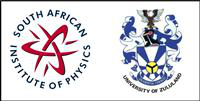Speaker
Ms
Nicola Orford
(University of the Witwatersrand)
Apply to be<br> considered for a student <br> award (Yes / No)?
Yes
Would you like to <br> submit a short paper <br> for the Conference <br> Proceedings (Yes / No)?
No
Level for award<br> (Hons, MSc, <br> PhD)?
MSc
Abstract content <br> (Max 300 words)
Dark matter is everywhere, but is elusive to any direct or indirect probe. We thus explore new astrophysical methods for indirect dark matter detection. Annihilation of dark matter particles produces emission signals that populate the whole electromagnetic spectrum, from radio to gamma-rays. In particular, we consider diffuse radio emission probes from dwarf spheroidal galaxies such as the Carina dwarf galaxy. Investigation of these emissions allows us to place strong limits on the mass of the dark matter particles and the velocity averaged annihilation rate and possibly arrive at a positive detection in the near future.
Main supervisor (name and email)<br>and his / her institution
Prof S. Colafrancesco
sergio.colafrancesco@wits.ac.za
University of the Witwatersrand
Primary author
Ms
Nicola Orford
(University of the Witwatersrand)
Co-authors
Dr
Marco Regis
(University of Torino - Italy)
Prof.
Sergio Colafrancesco
(University of the Witwatersrand)

